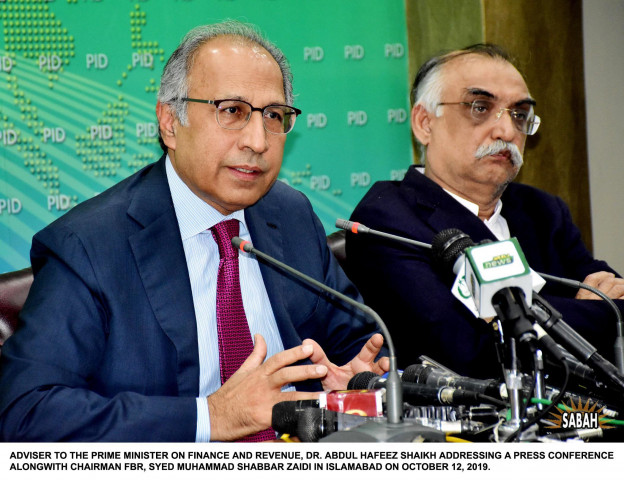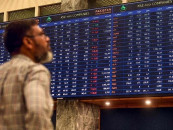Trade and fiscal deficits are under control: Hafeez Shaikh
Says difficult decisions taken by government are now showing results

Says difficult decisions taken by government are now showing results. PHOTO:SABAH
While addressing a press conference in Islamabad, he said that the trade deficit shrank 35% while the budget deficit reduced 36% during the first quarter of the current fiscal year (July-September) as compared to the previous year.
Shaikh did not directly mention the issue of inflation that has adversely affected the people and also did not talk about the constant decline in foreign direct investment.
"The difficult decisions taken by the government have started showing positive results," said the de-facto finance minister.
The federal budget deficit that had been recorded at Rs738 billion or 1.9% of GDP in the first quarter of the last fiscal year, was brought down to Rs476 billion or 1.1% of GDP, said the finance adviser.
As a result, the government has also met the International Monetary Fund (IMF) condition on the primary deficit, which is calculated by excluding the interest payments.
"The IMF's condition was that the primary deficit can be Rs102 billion in the first quarter, we actually have showed primary surplus of about Rs200 billion," said Finance Secretary Naveed Kamran Baloch.
The fiscal deficit narrowed down due to increase in revenues and reduction in expenditures, as the finance ministry did not issue any supplementary grant in the first quarter aimed at ensuring the fiscal discipline, said Shaikh.
"However, the improvements largely came due to cuts in development spending and increases in non-tax revenues, including one-off measure of payments of license fees by the telecom operators," he added.
To a question, Shaikh did not disclose the exact amount of development spending in the first quarter but said it was higher than the previous fiscal year.
The adviser said that the trade deficit also brought down by 35% to $5.7 billion in the July-September quarter of the current fiscal year.
Pakistan's macroeconomic situation significantly deteriorated in 2017-18 due to a record high budget deficit and current account deficit. The current account deficit had shown improvement in the first year of the Pakistan Tehreek-e-Insaf (PTI) government but the fiscal deficit widened to its highest level in decades by the end of fiscal year 2018-19.
Shaikh said that the Federal Board of Revenue's (FBR) tax collection increased by 16% but did not mention that the tax machinery missed its first quarter revenue collection target of Rs1.071 trillion by a wide margin of Rs113 billion.
"One thing that we have really improved on in comparison to the previous year is non-tax revenue," the finance adviser said.
He informed that as compared to the first quarter of the last fiscal year, non-tax revenues increased to Rs406, showing an increase of 219%.
"We think that this is a big achievement and we are now confident that the non-tax collection will be Rs1.6 trillion by end of fiscal year - Rs400 billion higher than the budgeted target for this fiscal year," Shaikh said.
He stated that against Rs51 billion profit in the first quarter of the last fiscal year, the State Bank of Pakistan(SBP) showed a profit of Rs185 billion in the first quarter of this fiscal year.
He hoped that the SBP would give additional Rs200 billion in the remainder period of this fiscal year.
Similarly, the Pakistan Telecommunication Authority (PTA) profit surged from Rs6 billion to Rs70 billion in the first quarter, which may increase to Rs408 billion by end of fiscal year, said the finance adviser.
The government anticipated Rs300 billion non-tax revenues from the sale of two Liquefied Natural Gas (LNG)-fired power plants, Rs130 billion dividends from the government's shareholding in various companies and Rs250 billion from Petroleum Development levy.
Shaikh said that the exchange rate was brought to stability during the past three months and the net portfolio investment increased after three years to $340 million, which showed foreign investors' confidence on the government.
However, he did not disclose how much of the $340-million was on account of hot money that flew into government securities due to higher than required interest rates.
The adviser said that the results of the assistance provided by the government to the export sector were starting to become visible, particularly in the production of the export sector.
To a question, Shaikh agreed that there was a need to bring other sectors into the definition of export-oriented sectors.
Currently, the government treats only five sectors, mainly textile and garments, as the export-oriented sectors and doles out annually billions of rupees among them on account of cheap financing, subsidised energy and tax concessions.
Despite these benefits, the textile sector has disappointed and is not showing major increase in exports. The All Pakistan Textile Mills Association enjoys a monopoly.
Shaikh said that there was also an increase in overseas employment by Pakistanis. From January to August last year, 224,000 people got job overseas, which increased to 375,000 during the first eight months of this calendar year.
To a question, Shaikh said that Pakistan's performance on the 27-point Action Plan of the Financial Action Task Force (FATF) has improved significantly.
"The situation has changed now as nearly 20 of the 27 conditions have been met by Pakistan," said the finance adviser.
It is the desire of the government and top priority of the prime minister to control money laundering, he added.
While speaking at the occasion, FBR Chairman Shabbar Zaidi said that Pakistan was in contact with the United Arab Emirates (UAE) government on the issue of Iqama.
He said that Iqama cannot be treated as UAE nationality and the Iqama holders were abusing the Residence by Investment Initiative.
The FBR chairman said that the Organization for Economic Cooperation and Development has also urged the UAE government to share the bank accounts information of the Iqama holders with their countries of origin.
To a question, the FBR chairman said that there was no deadlock with the traders and the negotiations were progressing "positively".
"The traders want to have turn-over based fixed tax scheme while the FBR's view is that the fixed tax should be based on the size of the shop," Zaidi said.
He hoped that the government will convince the traders to accept the CNIC condition but vowed that it would not be withdrawn.



















COMMENTS
Comments are moderated and generally will be posted if they are on-topic and not abusive.
For more information, please see our Comments FAQ